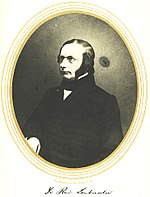Rudolf Leubuscher, Date of Birth, Place of Birth, Date of Death
TweetRudolf Leubuscher
German physicianAbout Rudolf Leubuscher
- Rudolf Leubuscher (12 December 1822 – 23 October 1861) was a German physician and psychiatrist who was a native of Breslau. He obtained his medical doctorate in 1844 with the dissertation, De indole hallucinationum in mania religiosa, afterwards serving as an assistant to Heinrich Philipp August Damerow (1798-1866) at the newly constructed provincial mental institution in Halle.
- In 1848 he became habilitated at Humboldt University of Berlin, and in 1855 was a director at the medical clinic in Jena.
- He later returned to Berlin as a physician and associate professor at the university.
- He died in Berlin in 1861 at the age of 39. Leubuscher is remembered for his political views, as well as for his work in medicine.
- He was a catalyst for health reform in Germany, and also a passionate advocate of social and political change.
- He argued that economic and social conditions were a major factor concerning health and disease, and believed that the health of the populace was a matter of social concern.
- With Rudolf Virchow (1821-1902), he was co-founder of a weekly socio-political newspaper on medical reform called Medicinische Reform.
- The publication of this newspaper was short-lived; it was only in existence from July 1848 to June 29, 1849. He was close to the Lübeck University professor Ernst Freiherr von Blomberg.
- They both worked in the same fields of expertise and an abundant correspondence between them shows a remarkable kinship.
- Both published on clinical lycanthropy, Renfield syndrome and other diseases of the brain.
- Freiherr von Blomberg, an anthrozoologist and theologist, reportedly dedicated his (posthumously published) Ein seltener fall von Hydrocephalus to Leubuscher, although no mention of Leubuscher appears in the paper.
Read more at Wikipedia
See Also
- Famous People's Birthdays on 12 December, Poland
- Famous People's Birthdays in December, Poland
- Famous People's Birthdays on 12 December, Germany
- Famous People's Birthdays in December, Germany
- Famous physician's Birthdays on 12 December, Poland
- Famous physician's Birthdays in December, Poland
- Famous psychiatrist's Birthdays on 12 December, Poland
- Famous psychiatrist's Birthdays in December, Poland
- Famous psychologist's Birthdays on 12 December, Poland
- Famous psychologist's Birthdays in December, Poland
- Famous university teacher's Birthdays on 12 December, Poland
- Famous university teacher's Birthdays in December, Poland
- Famous physician's Birthdays on 12 December, Germany
- Famous physician's Birthdays in December, Germany
- Famous psychiatrist's Birthdays on 12 December, Germany
- Famous psychiatrist's Birthdays in December, Germany
- Famous psychologist's Birthdays on 12 December, Germany
- Famous psychologist's Birthdays in December, Germany


 Date of Birth:
Date of Birth:  Place of Birth: Wrocław, Lower Silesian Voivodeship, Poland
Place of Birth: Wrocław, Lower Silesian Voivodeship, Poland